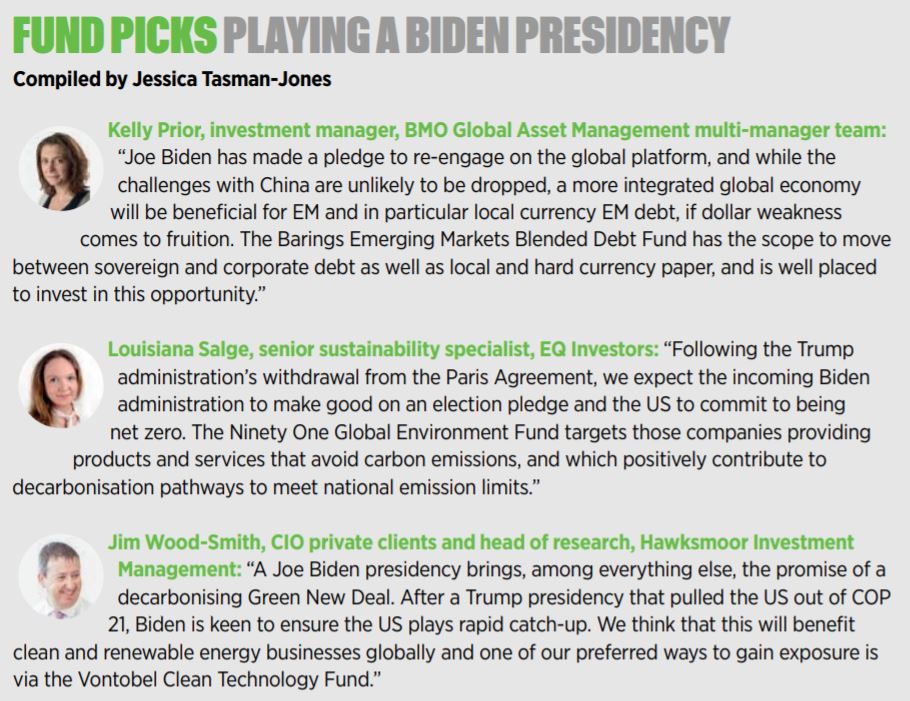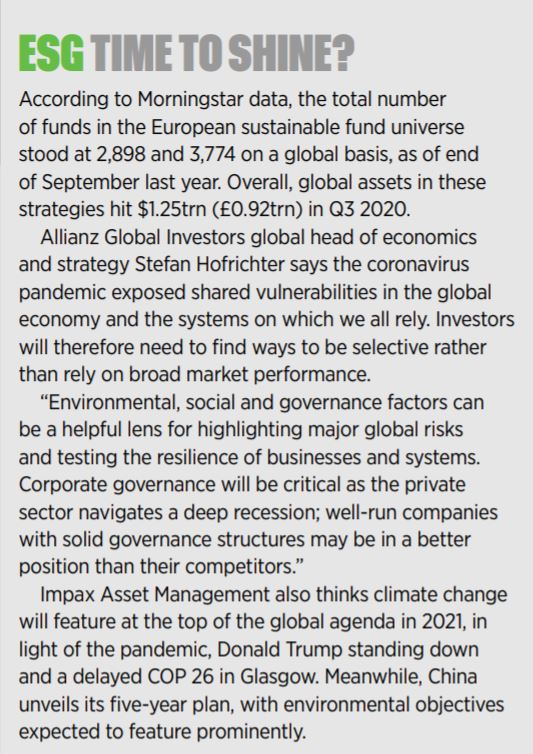Three themes will dominate the investment landscape in 2021: the global rollout of Covid-19 vaccines; the political make-up of the US under Joe Biden; and the outcome of the Brexit trade deal.
The most dominant of these is likely to be how the coronavirus pandemic develops in a world with vaccines, and how central banks and governments see fit to deal with it through lockdowns, as well as fiscal and monetary stimulus.
Franklin Templeton head of equities Stephen Dover believes the economic response to Covid-19 will continue to be the biggest uncertainty stalking global equity markets in 2021.
“It is likely to continue weighing on global economic activity and to keep pressure on policymakers to produce programmes that support economic activity until a vaccine is widely available,” he says.
At the end of last year, US Congress approved a stimulus package worth nearly $900bn (£661bn), the second-largest economic relief bill in American history. This came shortly after European Union leaders agreed a €1.8trn (£1.6trn) budget.
Closer to home, the UK is grappling with a deficit of £394bn (19% of GDP), the largest among major industrial nations, while public sector borrowing rose to a record high in the first eight months of the financial year at £284.7bn.
In contrast, China is the first major economy to recover from the pandemic, after reporting growth of 4.9% between July and September. The IMF forecasts emerging and developing economies overall are likely to grow at 6% in 2021 after a 3.3% contraction in 2020. Emerging Asia is expected to grow 8%, while China is set to lead the field by notching up 8.2%.
But more widely, investors ended last year on an optimistic note. The latest Bank of America Merrill Lynch (BofAML) fund manager survey for December found investors at their most bullish since 2013 as vaccine hopes induced strong ‘buy the reopening’ trade.
Cash levels among respondents fell to 4% as asset allocators underweighted the asset class for the first time since May 2013, triggering a ‘sell’ signal. BofAML notes this position is indicative of an early-stage recovery, as seen after the dotcom crash and the global financial crisis.
Shot in the dark?
Considering whether a vaccine will boost the rotation into cyclical stocks, Allianz Global Investors global head of economics and strategy Stefan Hofrichter says it remains unclear how long the rollout will take and how many people will be willing to be inoculated.
“Until then, many regions will likely grapple with subsequent waves of infections,” he says. “As we wait for effective vaccines and therapeutic treatments to be broadly adopted, the growth outlook will be unclear and private-sector spending, including private consumption and investments, could be suppressed.”
At the tail end of 2020, there was a rotation into cyclical names as markets absorbed positive news on a vaccine, prompting some to herald the long-awaited return of value investing.
Hofrichter expects value cyclicals such as industrials and financials to outperform in 2021 if the pandemic is brought under control. But if Covid-19 remains a threat, the winners of 2020 when lockdowns forced people to stay at home, such as technology, could also be the winners of 2021.
“Value names are much cheaper than they have historically been,” he says. “At the same time, it is too early to tell which way value stocks might go: we have not yet seen a catalyst that might cause the value/ growth gap to close.”
Fidelity International global CIO, equities, Romain Boscher, is not convinced the rotation into value names will gather much steam in the year ahead, given the structural challenges that still face two of the largest sectors: banks and oil.
He notes developed world banks face the prospect of low interest rates for an extended period, which means their return on investment is extremely low – and the number of non-performing loans could rise if the pandemic continues.
In terms of oil, he says low oil prices have stimulated economies during past crises, but Covid has hampered travel and leisure companies that might otherwise have benefited from cheaper fuel. Another threat to the sector is greener fiscal policy from governments around the world, which favours renewables.
“At the height of the pandemic, when oil prices fell 40%, renewable energy prices plateaued,” he says. “Major oil companies are taking note. Giants such as BP, Shell and Total have cut their dividends and reallocated capital to invest in green energy. Companies that get left behind in the transition to a low-carbon economy look increasingly at risk.”

Beware the zombies
But Boscher does think in the event of an effective vaccine in 2021 and a pickup in demand there are value opportunities for those willing to dig, particularly among cyclical sectors such as industrials and durable goods.
“Investors need to be careful of zombie firms, however, even if they appear to be good value,” he adds. “As witnessed in Japan, these fi rms can go on for years, being continuously refinanced without actually entering a formal default, and offering little or no increase in valuation.”
Trade deal progress
Markets reacted positively to the trade deal agreed between the UK and the European Union on Christmas Eve but fund managers warned this could be a short-term bump before uncertainty sets in over how the deal will play out.
At the time, Jupiter UK equities manager Richard Buxton described the deal as “skinny, lightweight, the bare minimum required … but a deal nevertheless”. But, he added: “This has to be good news for investors in UK equities and, after a very trying year, perhaps the best Christmas present many could have hoped for.”
But over the longer term, the economic picture could be different. Legal & General Investment Management European economist Hetal Mehta says while better than a no-deal, the fact the agreement does not cover services could introduce trade frictions and hamper immigration, which will likely erode the competitiveness of UK businesses and lower the domestic growth potential.
“As a reminder, many studies, and the government’s Brexit impact assessment (2018) suggest that in 15 years’ time, a free trade agreement would reduce the level of GDP by about 5% versus staying in the EU.”
Trump out, Biden in
Despite Donald Trump finally leaving the White House, Joe Biden assuming the US presidency has been slightly overshadowed by Covid as it continues to dominate the global landscape. But looking at the year ahead, investors are optimistic Biden’s premiership will usher in a more moderate approach to international relations compared with his predecessor, as well as a greener agenda.
According to Ninety One Asset Management’s 2021 outlook, Biden is likely to use more conventional diplomacy. However, his presidency will probably be less comfortable for China if US policy is implemented in a more structured and internationally collaborative way.
“Meanwhile, China will likely tone down ‘wolf-warrior diplomacy’, and concentrate on its priorities of domestic growth and technological self-sufficiency.”

Emerging markets boon
Ninety One also predicts 2021 could be the year of a wider sustained emerging market comeback, particularly in Asia, given depressed real rates, a weaker US dollar and vaccine-driven cyclical recoveries.
The latest BofAML fund manager survey found 60% of investors expect emerging markets to outperform in 2021 by a big margin. Financial advisers also believe emerging markets will deliver the best returns over the year ahead. A study by Aegon found 46% think the region will deliver the best returns for their clients, followed by US equities (44%) and Asia Pacific equities (40%).
Franklin Templeton’s Dover recognises opportunities in China and other emerging markets, mostly in Asia, and expects them to rebound more strongly from the economic weakness of 2020 than some developed market counterparts. “Asian economies in general have been well prepared for both the pandemic and the accelerated shift toward a more digital economy,” he says.
Ninety One singles out Chinese government bonds as offering an interesting alternative to developed government bonds, especially in light of the People’s Bank of China’s desire to avoid unconventional policies and negative interest rates, and after the country opened up its bond market to foreign investment.
“[China] is now the second-largest bond market in the world and one of the most liquid,” it says. “While not yet considered a developed and therefore defensive government bond market in a conventional sense, the direction of travel is clear.
“It remains our strong belief that Chinese government bonds will play an increasing role in global fixed income and multi-asset portfolios as their return and diversification properties become more widely recognised.”
Redmayne Bentley investment research co-ordinator James Rowbury thinks Chinese investments will benefit from Biden’s likely ‘softer touch’ to trade negotiations. “We believe the most exciting and fruitful opportunities will come from within Asia,” he says.
“Asian firms have typically focused their efforts domestically or within the region. However, this year we could potentially see large Asian tech companies start to foray into international markets and challenge the incumbent market leaders.
“As such, we remain overweight Asia and in particular China, with the country’s handling of the pandemic helping its economy and its businesses to continue operations with minimal impediments,” he says.
The domination of tech
The BofAML survey also found more than half of respondents (52%) think ‘long tech’ is the most overcrowded trade. But despite progress on vaccinations, some investors are pinning their hopes on stocks that benefit from the stay-at-home trend, to continue leading tech names.
Dover thinks the trends that have driven equity markets higher since the start of the pandemic, such as digital transformation and innovation in the technology, healthcare and consumer sectors, are set to continue.
“Remote work and e-commerce will become more entrenched over the coming decade, as tech companies continue to innovate and o¥ er new tools to help manage this ongoing digital transformation.”
But he notes investors have been squeamish about the high valuations found in many large tech stocks that have driven the US equity market higher over the past few years.
“There are plenty of opportunities in overlooked companies all over the world that are benefiting from these same trends but trading at more attractive valuations,” he says.
According to Polar Capital Global Technology Fund manager Ben Rogoff , many of the work-from-home technology beneficiaries remain well positioned for 2021 and many years beyond, supported by powerful, multi-year, secular tailwinds.
“The strong trends in the adoption of technology that have been accelerated by the Covid-19 crisis are likely to continue for many years to come and, as such, we still see many attractive stocks capable of delivering robust growth.”
Biotech boom
Dover also points to healthcare and consumer discretionary as promising long-term secular growth drivers.
“Within healthcare, we expect an ageing global population and growing middle-class to support demand for a range of medical services over the longer term.”
BB Biotech head of investment management Daniel Koller says the fight against Covid-19 has brought the biotech industry “blinking into the spotlight”, due to the unprecedented collaboration among the healthcare industry, regulatory agencies and political decision makers.
“From identifying a virus to approving a vaccine in under a year is just as spectacular as commentators claim: it is historically unparalleled,” he says. “While targeting Covid-19 in the short term, this scientific endeavour also has a positive and lasting effect on other areas.”
These other areas include therapies for chronic diseases and illnesses including cancer and rare, mostly genetic, diseases. Companies focusing on these two make up two-thirds of BB Biotech’s portfolio.
He says: “Take oncology as an example: we are convinced there will be an uptick in products for individual medicine, which will revolutionise the way in which this particular cancer is treated.”








